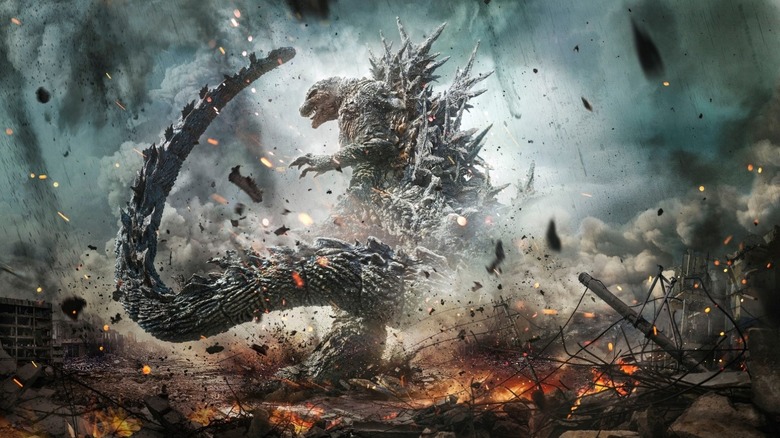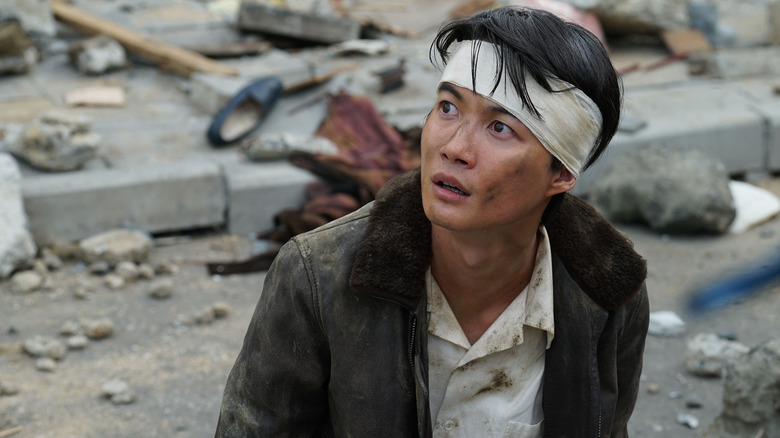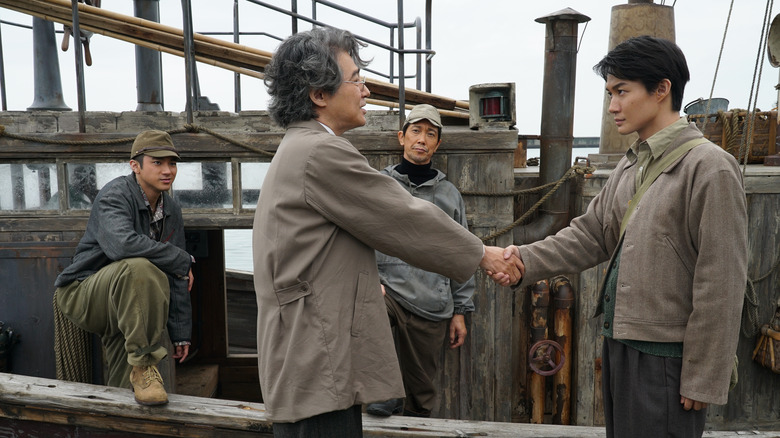Godzilla Minus One Does Something Very Differently From Other Kaiju Movies
Every "Godzilla" movie, and every kaiju movie in general, features stunning action and spectacle. Watching cities leveled to the ground while a big monster stomps all over the place is a big part of the appeal. But you need some pesky humans to make the destruction meaningful. While recent kaiju movies, particularly the American MonsterVerse movies, have struggled with this, the best of the Japanese "Godzilla" movies know and understand the importance of compelling human characters.
Still, most of them focus on big, heroic personalities. From the very first "Godzilla" movie, we see protagonists who are government or military types, part of a whole who rise up to take the fight to Godzilla through military might or science. "Shin Godzilla" focused heavily on the humans on the ground, but again, those characters were not individuals as much as they were part of the masses — bureaucratic groups, committees, scientists. That film was more about satire than about individual characters.
This is not the case with "Godzilla Minus One." Writer/director Takashi Yamazaki has crafted a terrific return to form for the King of Monsters, delivering thrilling and often terrifying kaiju destruction, in part thanks to a mighty redesign for Godzilla's atomic breath. The film is especially welcome after a couple of disappointing English-language films (though they did give us some memorable moments on the press circuit). Plus, "Godzilla Minus One" has something few other kaiju movies have — human characters as compelling as the titular character.
Compelling drama
"Godzilla Minus One" focuses on Koichi Shikishima, a kamikaze pilot who returns home after the end of World War II. He struggles with survivor's guilt, as well as having faked an engine malfunction to avoid fulfilling the role of a kamikaze. In the film, the heroes are not decorated commanders or big personalities, but losers — literally. Most of the first act of the film is spent exploring how devastated Japan was after WWII, focusing on battered people trying to rebuild their homes from the wreckage of a firebombed Tokyo.
They're at their lowest trying to rebuild, and the audience knows things will go from bad to worse. For Koichi, rebuilding means creating a makeshift home with a young woman and an orphaned baby girl she's adopted as her own. There's no space for romance or downtime — survival is all that matters. By focusing on Koichi and his band of misfit co-workers, who clear naval mines and struggle to adapt to their new reality, we care about them long before Godzilla arrives in Tokyo ready to destroy everyone.
Though still a movie about a giant monster destroying the city, "Godzilla Minus One" is also blatantly an anti-war movie. Koichi's arc is one about deprogramming, going from shame of not fulfilling his job as a suicide pilot to recognizing that shouldn't have been a job at all. When the movie introduces other soldiers willing to take the fight to Godzilla, they are not some hardened veterans. Instead, they are people who are shell-shocked, traumatized, and angry at how their government threw them into the grinder with zero regard for their lives.
Small-scale heroism
"Godzilla Minus One" is not "Shin Godzilla." It is not a movie about Japan reacting to Godzilla. It is a movie about the people who pick themselves back up after everything else failed them — their institutions, their government, their military.
It is telling that the triumphant moment at the climax of the film is not a scientist dropping a superweapon to kill Godzilla with the help of the Japanese Self-Defense Force. Instead, it is a flotilla of small fishing boats, tugboats, and other civilian vessels arriving to save the day, the Godzilla equivalent of the climax to "Dunkirk." Or, more accurately, the Godzilla equivalent to the scene in "Mamma Mia! Here We Go Again" when Bill and Harry arrive at Sophie's big party with a whole fleet of yachts and ferries full of hot Greek people singing and dancing along to ABBA's "Dancing Queen." Humans! Sometimes we do the right thing.
"Godzilla Minus One" is already a good kaiju film, but it's in its treatment of the human story that it becomes a great "Godzilla" film. It's easy to provide kaiju spectacle and awe, and to make people excited about a big monster destroying things. It's when the human drama is as compelling as the giant monster stuff, and the sight of a bunch of small boats is exciting as Godzilla using his atomic breath, that you get something truly spectacular.


